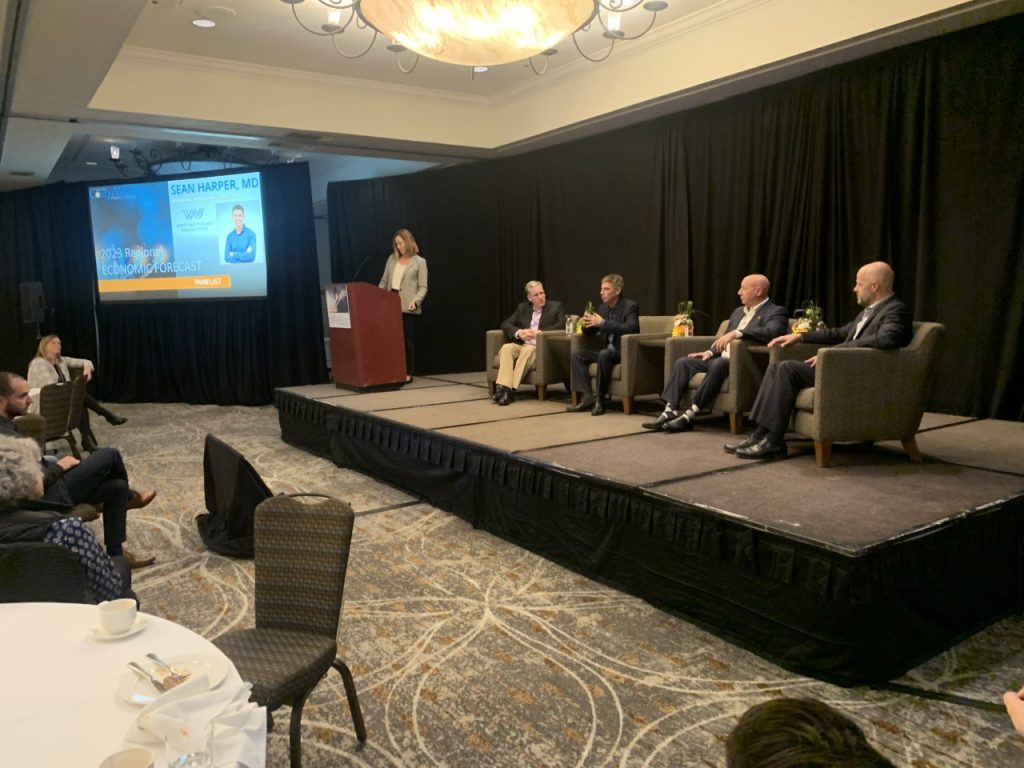Conejo Valley could be the next big biotech hotspot

Thousand Oaks’ biotech hub continues to grow and could rival the largest ones in the country in the next 10-15 years, speakers at a March 10 regional economic forecast program said.
The Thousand Oaks City Council has recognized that the growth of the life sciences sector is essential to the city’s economic development, City Manager Drew Powers said in a video played at the event at the Hyatt Regency Westlake hotel in Westlake Village.
“Over a dozen life science companies have taken root in Thousand Oaks over the last five years,” he said at the program presented by the Greater Conejo Valley Chamber of Commerce and attended by a packed audience.
That’s a reflection in part of the city’s commitment to making the permitting process as smooth as possible for new biotech firms coming to town, Powers said.
The city’s biotech hub in the Rancho Conejo Boulevard area is anchored by life sciences giant Amgen and includes about 16 other biotech firms.
Among them are Atara Biotherapeutics, Capsida Biotherapeutics and Latigo Biotherapeutics.
Other life sciences companies are located elsewhere in the city and other portions of the Conejo Valley.
Sean Harper, a co-founder and managing partner of Westlake Village BioPartners, a life sciences venture capital firm, said during a panel discussion that Thousand Oaks has seen a fairly steady growth of biotech companies.
“Thousand Oaks is just 10-15 years behind the hubs in Boston and the San Francisco Bay Area” – the largest in the country, he told the Business Times following the event.
BioPartners has raised more than $850 million in capital and has started about 20 life science companies in the last 4 and a half years, Harper said during the discussion.
About half of them are in the Thousand Oaks area with others in the larger biotech hubs in the San Francisco area and San Diego, he said.
“Thousand Oaks is certainly a growing biotech hub,” he told the Business Times. “It certainly isn’t on the scale of Boston or south San Francisco, but we are seeing the kind of growth that occurred with all of the same underpinning factors that went into making those hubs what they are today.”
Those factors include an “industry experience talent base and the laboratory-based personnel that comes directly out of universities,” he said.
Other factors are Thousand Oaks’ very biotech-receptive government and the local life science venture capability his company offers, Harper said.
Such factors “create a regular cadence of company formation and that really is what drives the hub,” he said.
Harper told the audience that BioPartners has partnered with Pasadena-based Alexandria Real Estate Equities to create a 19-acre life sciences campus in the city’s biotech hub with room for up to 20 new life sciences firms.
The campus at 1100 Rancho Conejo Blvd. will be the first one in the city built exclusively for biotech tenants.
The project was approved by the Thousand Oaks Planning Commission in November.
Harper said space in the city for new biotech companies is limited.
“So that’s one of the reasons Alexandria is building for more capacity,” he said.
Affordable housing for biotech employees in Thousand Oaks is always of concern to life sciences companies.
The city has green-lighted about 1,000 housing units in recent years, with about 10% being affordable.
Affordable housing is a must for entry-level talent recruited by start-up firms and offered less than exorbitant salaries, Harper said.
“And so, if there’s not some kind of affordable housing, they won’t take the job,” he said.
Other panelists were former long-time Thousand Oaks City Councilman Andy Fox, who more broadly addressed housing in Thousand Oaks, and Dave Pedersen, general manager of the Las Virgenes Municipal Water District, who spoke about water issues during the state’s prolonged drought.
The panel was moderated by state Assemblymember Jacqui Irwin, D-Thousand Oaks.
Local economist Matthew Fienup, keynote speaker at the event, for the second time in recent weeks forecasted that Ventura County is facing a long, slow post-pandemic economic recovery.
That’s the two-year prognosis by the Center for Economic Research and Forecasting at California Lutheran University in Thousand Oaks, where Fienup is executive director.
The forecast found that the county will see slower growth than neighboring counties in the short term due in large part to its weak pre-pandemic economy.
But Fienup said the long-term outlook is “quite a bit brighter” due to a fundamental change in attitudes by the county’s cities about growth: that a balance can be achieved between jobs, housing and the environment to preserve the quality of life.
The forecast was unveiled at a Feb. 21 program at the Scheer Forum Theater in the Thousand Oaks Civic Arts Plaza.









